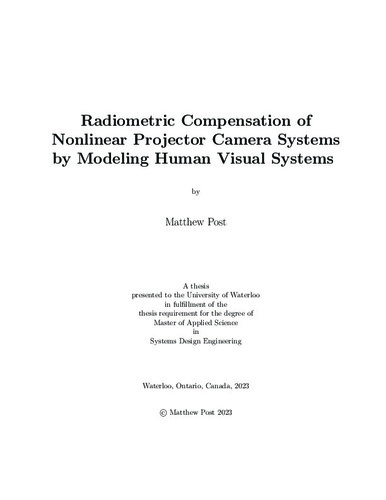| dc.contributor.author | Post, Matthew | |
| dc.date.accessioned | 2023-04-21 19:43:54 (GMT) | |
| dc.date.available | 2023-04-21 19:43:54 (GMT) | |
| dc.date.issued | 2023-04-21 | |
| dc.date.submitted | 2023-04-19 | |
| dc.identifier.uri | http://hdl.handle.net/10012/19307 | |
| dc.description.abstract | Radiometric compensation is the process of adjusting the luminance and colour output of images on a display to compensate for non-uniformity of the display. In the case of projector-camera systems, this non-uniformity can be a product of both the light source and of the projection surface. Conventional radiometric compensation techniques have been demonstrated to compensate the output of a projector to appear correct to a camera, but a camera does not possess the colour sensitivity and response of a human. By correctly modelling the interaction between a projector stimulus and camera and human colour
responses, radiometric compensation can be performed for a human tristimulus colour model rather than that of the camera.
The result is a colour gamut which is seen to be correct for a human viewer but not necessarily the camera. A novel radiometric compensation method for projector-camera systems and textured surfaces is introduced based on the human visual system (HVS) colour response. The proposed method for modelling human colour response can extend established compensation methods to produce colours which are human-perceived to be correct (egocentric modelling). As a result, this method performs radiometric compensation which is not only consistent and precise, but also produces images which are visually accurate to an external colour reference. Additionally, conventional radiometric compensation relies on a solution of a linear system for the colour response of each pixel in an image, but this is insufficient for modelling systems containing a nonlinear projector or camera. In the proposed method, nonlinear projector output or camera response has been modelled in a separable fashion to
allow for the linear system solution for the human visual space to be applied to nonlinear projector-camera systems.
The performance of the system is evaluated by comparison with conventional solutions in terms of computational speed, memory requirements, and accuracy of the colour compensation. Studies include the qualitative and quantitative assessment of the proposed compensation method on a variety of adverse surfaces, with varying colour and specularity which demonstrate the colour accuracy of the proposed method. By using a spectroradiometer outside of the calibration loop, this method is shown to produce generally the lowest average radiometric compensation error when compared to compensation performed using only the response of a camera, demonstrated through quantitative analysis of compensated colours, and supported by qualitative results. | en |
| dc.language.iso | en | en |
| dc.publisher | University of Waterloo | en |
| dc.subject | radiometric compensation | en |
| dc.subject | photometric compensation | en |
| dc.subject | projector | en |
| dc.subject | camera | en |
| dc.subject | human visual space | en |
| dc.subject | human tristimulus response | en |
| dc.subject | tristimulus response | en |
| dc.subject | camera-projector calibration | en |
| dc.subject | camera calibration | en |
| dc.subject | projector calibration | en |
| dc.subject | light | en |
| dc.subject | camera projector calibration | en |
| dc.subject | camera projector system | en |
| dc.subject | camera-projector system | en |
| dc.subject | camproj system | en |
| dc.subject | projcam system | en |
| dc.subject | nonlinear modeling | en |
| dc.subject | human colour peception | en |
| dc.subject | human color perception | en |
| dc.subject | data projector | en |
| dc.subject | video projector | en |
| dc.subject | colour | en |
| dc.subject | color | en |
| dc.subject | outlier detection | en |
| dc.subject | inpainting | en |
| dc.subject | infilling | en |
| dc.subject | colour model | en |
| dc.subject | color model | en |
| dc.subject | bit depth | en |
| dc.subject | solution stability | en |
| dc.title | Radiometric Compensation of Nonlinear Projector Camera Systems by Modeling Human Visual Systems | en |
| dc.type | Master Thesis | en |
| dc.pending | false | |
| uws-etd.degree.department | Systems Design Engineering | en |
| uws-etd.degree.discipline | System Design Engineering | en |
| uws-etd.degree.grantor | University of Waterloo | en |
| uws-etd.degree | Master of Applied Science | en |
| uws-etd.embargo.terms | 0 | en |
| uws.contributor.advisor | Fieguth, Paul | |
| uws.contributor.affiliation1 | Faculty of Engineering | en |
| uws.published.city | Waterloo | en |
| uws.published.country | Canada | en |
| uws.published.province | Ontario | en |
| uws.typeOfResource | Text | en |
| uws.peerReviewStatus | Unreviewed | en |
| uws.scholarLevel | Graduate | en |

